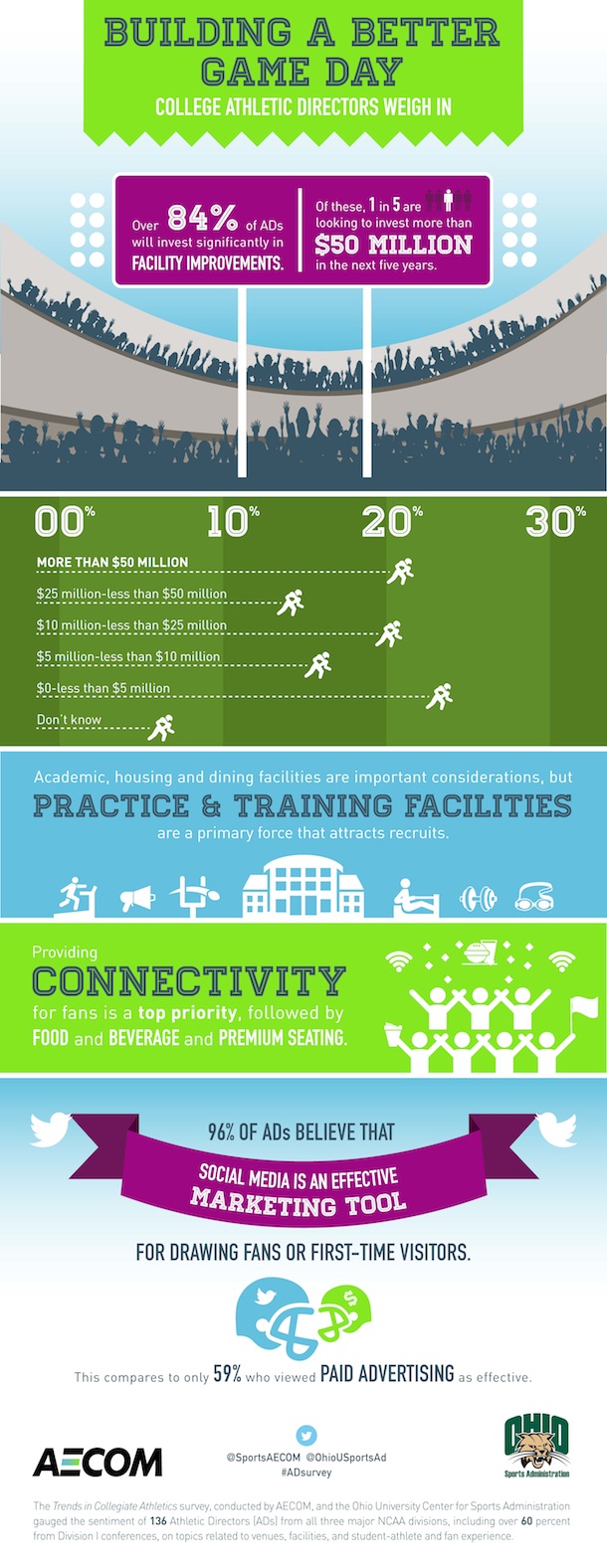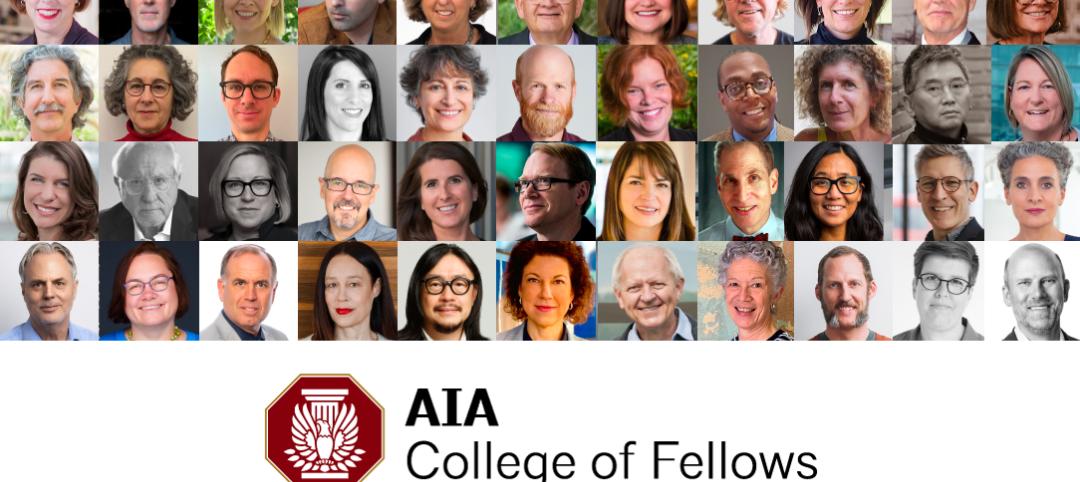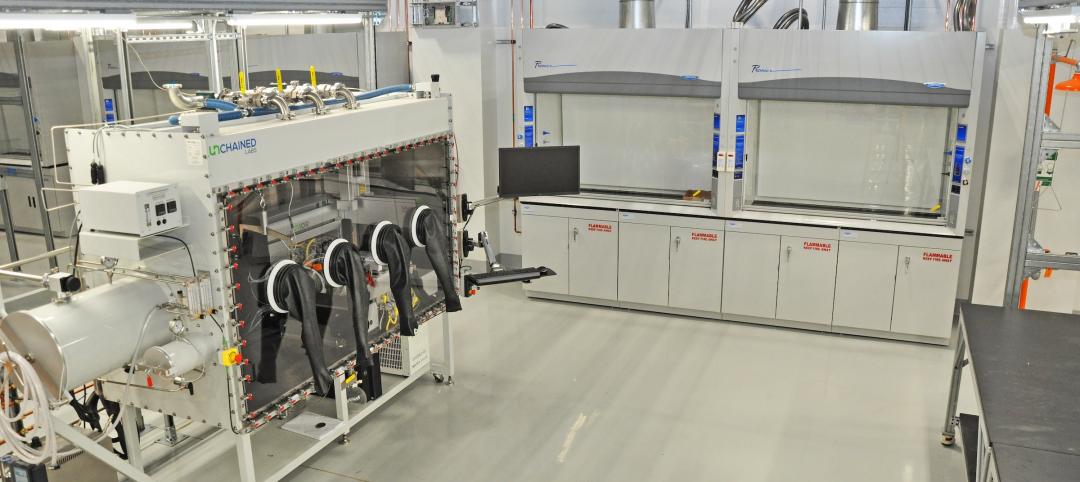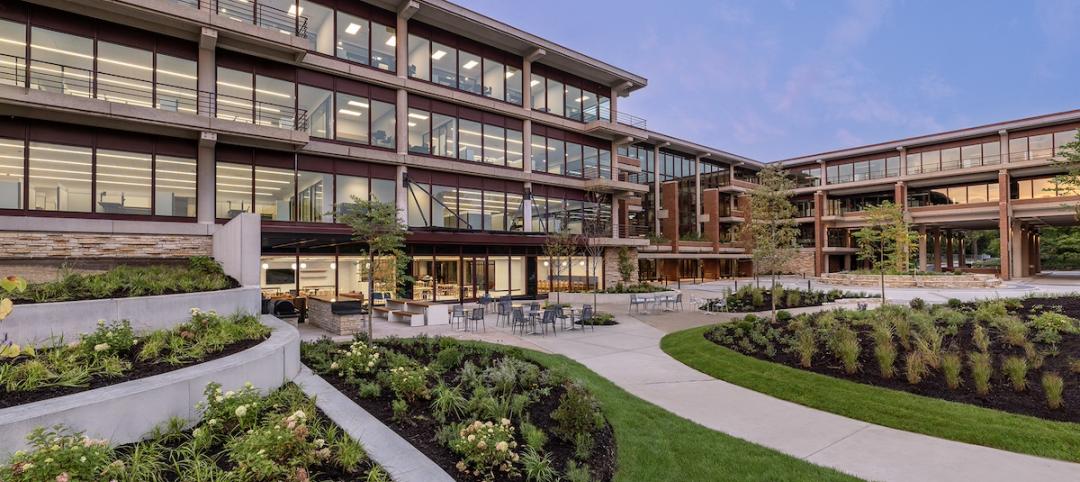According to a survey released today, NCAA athletic directors (ADs) are increasingly focused on enhancing athletic facilities to attract top student athletes and maintain or grow their fan base amidst an extremely competitive environment.
The Trends in Collegiate Athletics survey, conducted by AECOM and Ohio University's Center for Sports Administration, was completed in July-August 2014. The survey gauged the sentiment of 136 ADs from all three major NCAA divisions, including over 60% from Division I conferences, on topics related to venues, facilities, and student-athlete and fan experience.
According to the survey, more than eight in 10 participating ADs plan to make significant investments in facilities over the next five years to target potential recruits and spectators. Of those, one in five plans on spending more than $50 million on renovations and new construction projects. Nearly 95% of ADs are concerned about the funding of their programs.
The majority of participating ADs are investing in upgrades and amenities that they believe will drive game-day attendance and enhance the fan experience, notably connectivity, better food and beverage options, and, particularly at the Division I level, premium seating.
“This survey shows that, as traditional funding streams become less viable, ADs are increasingly focused on fiscal responsibility and making their programs sustainable,” said Jon Niemuth, AECOM Director of Sports, Americas. “One way they are doing this is by investing in upscale amenities, once reserved for the professional level, that will attract fans willing to pay a premium for a unique game day experience.”
“A big issue keeping athletic directors up at night is the funding and performance of their programs,” said Dr. Heather Lawrence-Benedict, Associate Professor of Sports Administration and the AECOM Professor of Sport Business, Ohio University. “ADs are caught in a cyclical pattern—to generate funding they need talented recruits, to attract recruits they need the top facilities, and to build those facilities it goes back to funding. On top of this, they need to appeal to alumni and donors. An unexpected donation, a breakout athlete or a Cinderella season can all be major catalysts for an athletics program.”
To help generate awareness for their upgrades and promote games and game-day activities, the vast majority of ADs (96%) in the study find social media to be an effective marketing tool for drawing fans or first-time visitors to games. That compares to 59% who view paid advertising as effective. Lowering ticket costs was ranked as the least effective option to draw fans by one-third of participating ADs.
ADs are also focused on facility upgrades that will enhance the student athlete experience, and ADs overwhelmingly agree that practice and training facilities are a primary force that attracts recruits, while academic, housing and dining facilities are also rapidly becoming important. If funding was not a factor, ADs would invest heavily in practice and training facilities and locker rooms to appeal to potential recruits.
AECOM and Ohio University’s Center for Sports Administration developed the Trends in Collegiate Athletics through a collaborative effort as part of their ongoing strategic partnership, which began in 2007. The joint effort, which was extended for the third time in 2013, is aimed at educating the next generation of sports business leaders.
To view the full results of the survey, click here.
Related Stories
Office Buildings | Mar 8, 2024
Conference room design for the hybrid era
Sam Griesgraber, Senior Interior Designer, BWBR, shares considerations for conference room design in the era of hybrid work.
Architects | Mar 8, 2024
98 architects elevated to AIA's College of Fellows in 2024
The American Institute of Architects (AIA) is elevating 96 member-architects and 2 non-member-architects to its College of Fellows, an honor awarded to architects who have made significant contributions to the profession. The fellowship program was developed to elevate architects who have achieved a standard of excellence in the profession and made a significant contribution to architecture and society on a national level.
Sports and Recreational Facilities | Mar 7, 2024
Bjarke Ingels’ design for the Oakland A’s new Las Vegas ballpark resembles ‘a spherical armadillo’
Designed by Bjarke Ingels Group (BIG) in collaboration with HNTB, the new ballpark for the Oakland Athletics Major League Baseball team will be located on the Las Vegas Strip and offer panoramic views of the city skyline. The 33,000-capacity covered, climate-controlled stadium will sit on nine acres on Las Vegas Boulevard.
Adaptive Reuse | Mar 7, 2024
3 key considerations when converting a warehouse to a laboratory
Does your warehouse facility fit the profile for a successful laboratory conversion that can demand higher rents and lower vacancy rates? Here are three important considerations to factor before proceeding.
Shopping Centers | Mar 7, 2024
How shopping centers can foster strong community connections
In today's retail landscape, shopping centers are evolving beyond mere shopping destinations to become vibrant hubs of community life. Here are three strategies from Nadel Architecture + Planning for creating strong local connections.
Market Data | Mar 6, 2024
Nonresidential construction spending slips 0.4% in January
National nonresidential construction spending decreased 0.4% in January, according to an Associated Builders and Contractors analysis of data published today by the U.S. Census Bureau. On a seasonally adjusted annualized basis, nonresidential spending totaled $1.190 trillion.
MFPRO+ Special Reports | Mar 6, 2024
Top 10 trends in senior living facilities for 2024
The 65-and-over population is growing faster than any other age group. Architects, engineers, and contractors are coming up with creative senior housing solutions to better serve this burgeoning cohort.
Architects | Mar 5, 2024
Riken Yamamoto wins 2024 Pritzker Architecture Prize
The Pritzker Architecture Prize announces Riken Yamamoto, of Yokohama, Japan, as the 2024 Laureate of the Pritzker Architecture Prize, the award that is regarded internationally as architecture’s highest honor.
Office Buildings | Mar 5, 2024
Former McDonald’s headquarters transformed into modern office building for Ace Hardware
In Oak Brook, Ill., about 15 miles west of downtown Chicago, McDonald’s former corporate headquarters has been transformed into a modern office building for its new tenant, Ace Hardware. Now for the first time, Ace Hardware can bring 1,700 employees from three facilities under one roof.
Green | Mar 5, 2024
New York City’s Green Economy Action Plan aims for building decarbonization
New York City’s recently revealed Green Economy Action Plan includes the goals of the decarbonization of buildings and developing a renewable energy system. The ambitious plan includes enabling low-carbon alternatives in the transportation sector and boosting green industries, aiming to create more than 12,000 green economy apprenticeships by 2040.

























